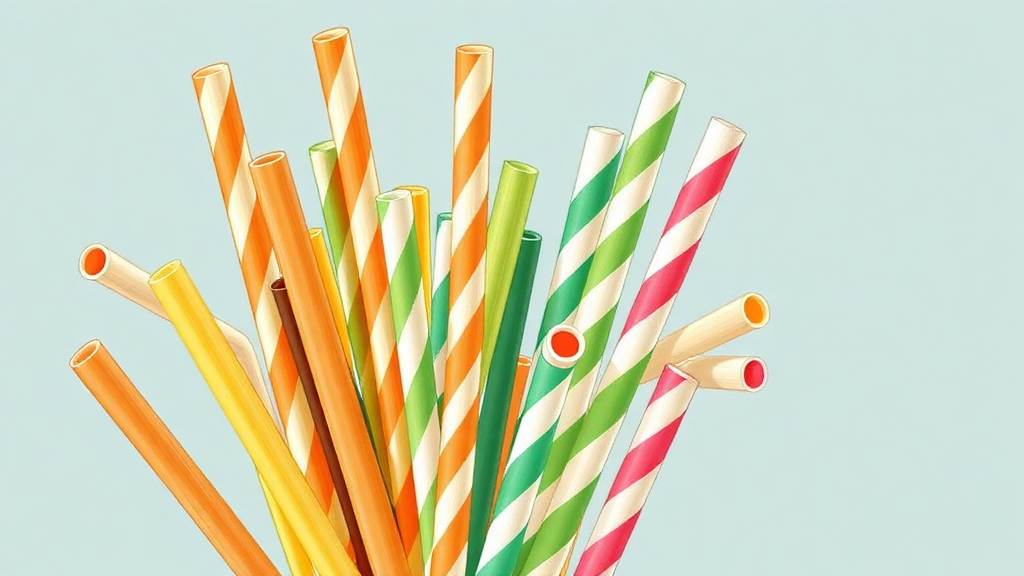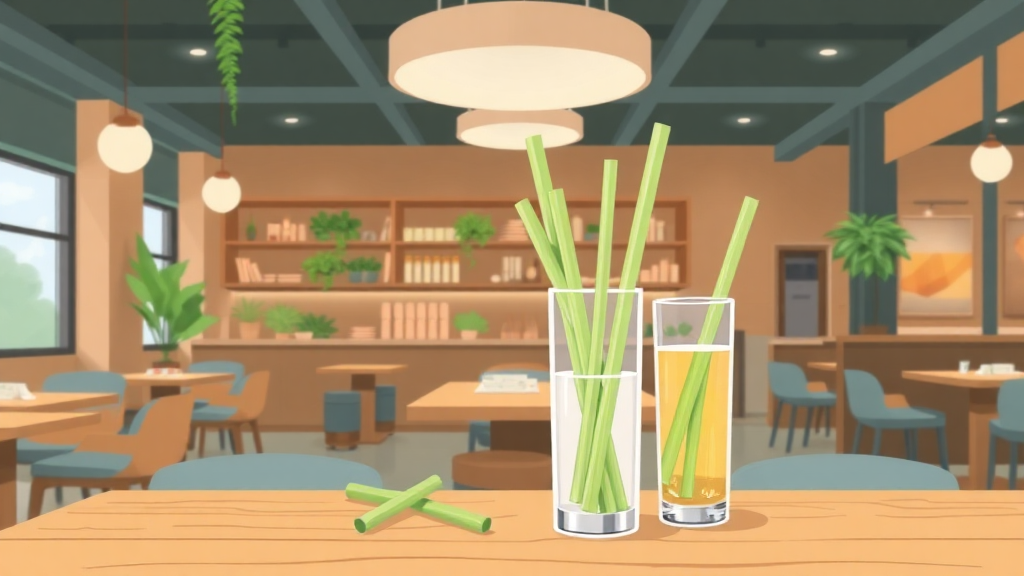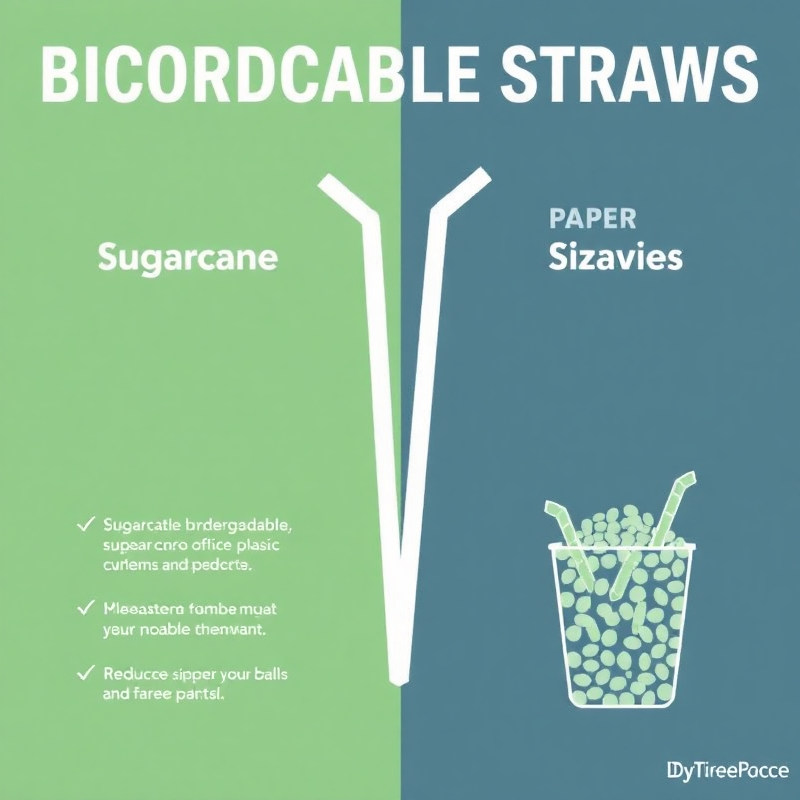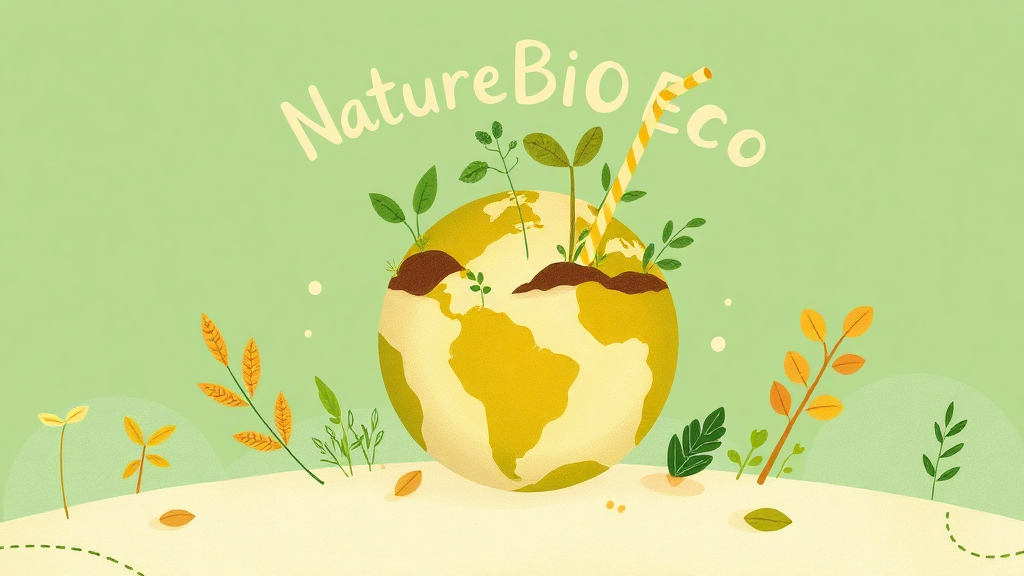
| Material | Rating | Price Range | Composting Type | Descripción |
|---|---|---|---|---|
| compostable en casa | ★★★★☆ | $0.08–$0.12 | Biodegradable and compostable at home | Withstands heat well. |
| PLA bioplástico | ★★★★☆ | $0.06–$0.10 | Sólo industriales | Requires industrial composting facilities; mimics plastic from our product range functionality. |
| Papel | ★★☆☆☆ | $0.03–$0.06 | Limited by PFAS | Susceptible to sogginess; some brands contain hazardous coatings. |
| Wheat Stems | ★★★☆☆ | $0.01–$0.05 | compostable en casa | Biodegradable and compostable at home; a relatively new alternative. |
Key Considerations for Choosing Sustainable Straws
- PLA bioplastic: While functionally similar to plastic, it requires industrial composting facilities, limiting its widespread home compostability. Assess the availability of industrial composting facilities in your area before switching to this plastic alternative.
- Pajitas de papel: The presence of PFAS in some paper straws necessitates careful supplier selection and verification of certifications. Look for independent third-party certifications confirming the absence of harmful chemicals.
- Sugarcane straws: Made from bagasse (agricultural waste), sugarcane straws offer a superior combination of biodegradability, heat resistance, and cost-effectiveness. They are a great eco-friendly plastic alternative.

Sugarcane Straws: A Zero-Waste Standout
Sugarcane-based straws address common pain points associated with plastic waste reduction while offering operational ease and cost-effectiveness for businesses.
Benefits of Sugarcane Straws:
- Compostable en casa: Break down in backyard compost bins within weeks, reducing landfill waste. This aligns with growing consumer demand for environmentally friendly products and reduces plastic waste.
- Heat-Resistant: Maintain structural integrity in hot beverages up to 85°C. This is crucial for businesses serving hot drinks.
- Rentable: Bulk pricing significantly lowers the per-unit cost compared to reusable models, making them a viable option for high-volume businesses.
Actionable Steps for Businesses Transitioning to Sugarcane Straws:
- Partner with reputable suppliers: Choose suppliers who can provide certifications confirming the biodegradability and compostability of their straws from boba straws and who offer customizable branding options (e.g., prints or colors) to enhance your brand identity.
- Educate patrons: Use signage and other communication channels to inform customers about your commitment to sustainability and the benefits of your chosen straw alternative. Highlight the eco-friendly nature of the sugarcane straws and their compostability.
- Implement a comprehensive waste management system: Ensure proper disposal methods are in place to facilitate the composting process. This might involve providing compost bins for customers or partnering with local composting facilities.
- Monitor and evaluate: Regularly assess the performance and cost-effectiveness of your chosen straw alternative. Gather feedback from customers and staff to identify areas for improvement.
By carefully considering the regulatory landscape and available alternatives, businesses can make informed decisions that minimize their environmental impact while maintaining operational efficiency and satisfying customer expectations. To achieve zero-waste initiatives, businesses must prioritize sustainable alternatives to single-use plastics, particularly straws. This transition offers significant environmental and economic benefits.
Significant Environmental and Economic Benefits of Eco-Friendly Straws
Aligning with growing consumer demand for eco-conscious practices, this article explores the shift towards sustainable alternatives to plastic straws. Switching to sugarcane straws, for instance, offers businesses a chance to reduce their environmental footprint while potentially saving money in the long run.

Plastic Straw Bans: A Path to Sustainability
Sustainable Straw Alternatives for Businesses
This article explores the transition to eco-friendly straws, focusing on sugarcane and PLA bioplastic options. We’ll examine their durability, cost-effectiveness, sourcing, disposal methods, and overall impact on businesses’ sustainability goals.

Switching from plastic straws to sustainable alternatives like sugarcane and PLA bioplastic offers businesses a significant opportunity to reduce their environmental footprint and enhance their brand image. The benefits extend beyond simply complying with plastic bans; they encompass cost savings, improved customer perception, and a stronger commitment to corporate social responsibility.

FAQs on Eco-Friendly Straw Adoption
Take Action Today
Embracing plastic-free initiatives isn’t merely about compliance; it’s a strategic move to enhance your brand image and attract environmentally conscious consumers. For businesses ready to pilot sustainable straw solutions:
📩 Claim Free Samples: Visita NatureBioEco’s Partner Portal to request tailored sugarcane straw samples for your establishment. Consider requesting samples of both sugarcane and PLA straws to compare durability and suitability for your specific needs.
By adopting plastic-free alternatives, you actively contribute to global ocean conservation and meet the increasing demand for sustainable hospitality practices. This commitment resonates positively with customers and enhances brand reputation.
Case Studies: Successful Implementation of Sustainable Straws
Case Study 1: A Major Coffee Chain’s Transition to Sugarcane Straws
A leading European coffee chain successfully transitioned to sugarcane straws across all its outlets. This resulted in a remarkable 40% reduction in plastic waste within six months. Furthermore, positive customer feedback, with 85% of patrons expressing appreciation for the eco-friendly initiative, demonstrates the positive impact on customer perception. This success highlights the feasibility and positive reception of such a transition.

Case Study 2: A U.S. Restaurant Chain’s Adoption of PLA Bioplastic Straws
A prominent U.S. restaurant chain integrated PLA bioplastic straws into its sustainability strategy. Despite a higher upfront cost, the chain achieved a 25% reduction in overall waste management expenses due to the straws’ industrial compostability. This cost savings, coupled with a 15% increase in customer loyalty, showcases the long-term financial and reputational benefits. This demonstrates that while initial investment may be higher, the long-term returns can be substantial.

Data Insights: The Impact of Plastic Straw Bans
- Impacto ambiental: Studies indicate that plastic straw bans significantly reduce plastic pollution in oceans and landfills.

Reduce Plastic Waste with Sustainable Sugarcane Straws for Your Business
Plastic straw bans are significantly reducing plastic waste, achieving up to a 50% decrease in urban areas. This highlights the substantial environmental benefits of eliminating single-use plastics and switching to sustainable alternatives like sugarcane straws. Businesses are increasingly recognizing the importance of this shift, both for environmental responsibility and for attracting environmentally conscious consumers.

A 2022 survey showed a strong 70% consumer preference for businesses using sustainable straws. This preference presents a significant market opportunity for businesses to cater to environmentally conscious consumers and improve their sustainability profile.
Beneficios económicos de cambiar a pajitas de caña de azúcar
Switching to eco-friendly sugarcane straws can yield substantial long-term cost savings, potentially reaching up to 30% on waste management costs over five years. These savings can be reinvested in other business aspects, enhancing profitability and demonstrating a strong return on investment.
Actionable Insights for Businesses Transitioning to Sugarcane Straws
- Conduct a Waste Audit: Begin by thoroughly assessing your current plastic straw usage to identify areas for improvement and establish a baseline for measuring the impact of your transition to sugarcane straws. This data-driven approach ensures efficient resource allocation.
- Engage Stakeholders: Involve employees and customers in the transition process. Employee training and transparent communication with customers build support and foster a sense of shared responsibility. Actively solicit customer feedback to address concerns or challenges.
- Monitor and Evaluate: Continuously track the impact of your new sugarcane straws on waste reduction and customer satisfaction. Regular monitoring allows adjustments to your strategy, optimizing sustainability efforts and maximizing positive outcomes. Use data to demonstrate ROI and refine your approach.

Conclusión
The transition away from single-use plastic straws presents a substantial opportunity for businesses to enhance their sustainability profile, attract environmentally conscious customers, and achieve significant long-term cost savings. By carefully evaluating sustainable alternatives like sugarcane straws, implementing effective strategies, and consistently monitoring progress, businesses can contribute significantly to global environmental conservation while gaining a competitive edge.
Claim your free sugarcane straw samples today! Visit NatureBioEco’s Partner Portal (insert Partner Portal link here) to request a customized sample pack tailored to your specific venue’s needs. We offer a range of sugarcane straw options, varying in diameter, length, and color, to ensure a perfect fit with your existing drinkware and brand aesthetic. Specify your requirements during the request process – for example, indicate if you prefer a thicker straw for smoothies or a thinner option for cocktails. We’ll send you a selection to test and ensure complete satisfaction before committing to a larger order.

Sustainable Sugarcane Straws for Businesses
Marketing materials can further amplify this positive message. For example, you could include a short statement like, “We’re committed to environmental sustainability, using 100% compostable sugarcane straws.”

Furthermore, transitioning to sugarcane straws offers significant advantages.
Reduce Costs and Improve Efficiency with Sugarcane Straws
Switching to sugarcane straws can improve your operational efficiency. Unlike plastic straws, sugarcane straws are often sourced locally, reducing transportation costs and lead times. Their biodegradable nature also simplifies waste management, reducing your reliance on single-use plastic recycling programs and potentially lowering your waste disposal expenses. Many municipalities offer incentives for businesses that actively reduce their environmental footprint; investigate local programs to see if you qualify for any financial benefits.
Frequently Asked Questions about Sugarcane Straws
Ready to Make a Positive Impact with Sustainable Plastic Alternatives?
Request your free samples now and experience the difference that sustainable, eco-friendly solutions can make for your business. Don’t hesitate to contact our team (or ) if you have any questions or require further assistance.

Preguntas frecuentes sobre las pajitas de caña de azúcar
Q: What are the environmental benefits of using sugarcane straws?
Sugarcane straws are made from bagasse, a byproduct of sugarcane processing, making them a sustainable and renewable resource. Their biodegradability significantly reduces plastic waste in landfills and oceans.
Q: How cost-effective are sugarcane straws compared to plastic?
While initial costs might seem slightly higher, bulk purchasing of sugarcane straws often leads to lower per-unit costs compared to plastic, especially for high-volume businesses. The long-term savings from reduced waste management costs can also be significant.
Q: Are sugarcane straws durable enough for thick drinks?
A: Yes. Sugarcane straws, unlike paper straws, effectively withstand thick drinks like milkshakes and smoothies without disintegrating. Their superior durability makes them a practical and sustainable alternative to plastic straws.
Q: How do costs compare to plastic straws?
A: While the initial cost might be higher, bulk purchasing of sugarcane or PLA straws significantly reduces expenses over time, potentially saving businesses approximately 30% compared to the ongoing cost of repeatedly purchasing plastic straws. This long-term cost savings offsets the initial investment.
Q: Where can businesses source sugarcane straws?
A: Reputable suppliers such as Green Straws and Holy City Straw Company offer bulk shipments of sugarcane straws that meet ASTM (American Society for Testing and Materials) standards, ensuring quality and consistency. It’s crucial to verify supplier certifications to guarantee the product’s sustainability claims.
Q: Do compostable options require special disposal?
A: Sugarcane and wheat straw alternatives decompose naturally in most composting environments. However, PLA (polylactic acid) bioplastic straws require industrial composting facilities for proper breakdown. Clearly communicate disposal instructions to customers to maximize environmental benefits.
Q: What are the environmental benefits of using sugarcane straws?
Sugarcane straws are a fully compostable and biodegradable alternative to plastic straws. Switching to sugarcane straws directly reduces plastic waste and helps combat ocean pollution, a significant environmental concern.
Q: How can businesses benefit from switching to sugarcane straws?
Businesses benefit from reduced waste management costs, improved brand image, and the ability to attract environmentally conscious customers. The transition to sugarcane straws aligns with growing consumer demand for sustainable practices.
Q: Are sugarcane straws truly biodegradable?
Yes, sugarcane straws are completely biodegradable and compostable, unlike plastic straws which persist in the environment for hundreds of years. This makes them a sustainable alternative for businesses committed to reducing their environmental impact.
Q: Where can I source sugarcane straws for my business?
Contact us today to learn more about sourcing high-quality, sustainable sugarcane straws for your business. We offer competitive pricing and reliable delivery.







